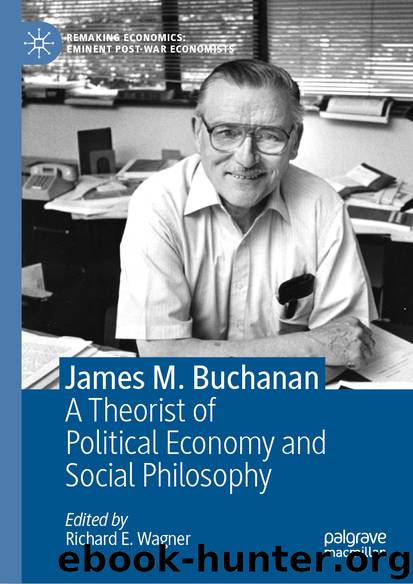James M. Buchanan by Richard E. Wagner

Author:Richard E. Wagner
Language: eng
Format: epub
ISBN: 9783030030803
Publisher: Springer International Publishing
Who Makes Constitutional Rules?
A public choice approach to constitutional decision-making must recognize that an elite few are in the position of actually designing constitutional rules. Even the design of the Constitution of the United States, that provided the inspiration for Buchanan and Tullock (1962), was designed by an elite few who were selected to attend the Constitutional Convention, and perhaps equally significantly, were able to attend. The Constitutional Convention extended from May through September of 1787, an entire growing season, which made it impossible for most people in an agrarian economy to participate, even if they wanted to. The Convention was shrouded in secrecy, as Holcombe (2002) explains, preventing anyone but a few delegates from participating in its design. Beard (1913) concludes that the Constitution was designed by elites to further their own interests.
Congleton (2011) draws similar conclusions about the development of the constitutions of European governments. He describes a process whereby different elites negotiated based on their interests, which resulted in an evolving constitutional framework based on the relative powers of each group. Members of the masses have some voice because they can participate in interest group politics, and they do get to vote, as Wittman (1989, 1995) notes. And, Becker (1983) concludes, the legislature can act as a political marketplace in which competing interests are weighed against each other. However, individuals have an incentive to free ride off the efforts of others, Olsen (1965) notes, and Downs (1957) argues that individuals tend to be rationally ignorant regarding politics, because they realize that their actions will have no influence on political outcomes. The masses have no influence because they are in the high-transaction cost group.
A public choice approach to constitutional decision-making recognizes that actual constitutional rules are not unanimously approved; they are designed by an elite few who bargain with each other to design the rules for their benefit. Sometimes the rules that benefit the elite also benefit the masses. Other times, rules that benefit the elite impose costs on the masses.
Public choice clearly recognizes that public policy often benefits some at the expense of others. The rent-seeking literature (Tullock 1967; Krueger 1974) depicts some people as receiving rents by imposing costs on others. The literature on regulatory capture (Stigler 1971) depicts some people as capturing the regulatory process for their benefit, at the expense of others, and interest group theory (Olson 1965) explains how concentrated interests are able to generate benefits for themselves by imposing costs on the masses. The elite—the members of the low-transaction cost group—are the people who receive the rents, who capture regulatory agencies, and who are the concentrated interests who benefit at the expense of others. These same insights that public choice has developed and applied to post-constitutional decision-making also apply to the development constitutional rules. The elite few design them, but they apply to everyone.
The first step in a public choice analysis of constitutional decision-making is to recognize that constitutional rules can never be agreed to by everyone who is subject to them, except when the size of the group is very small.
Download
This site does not store any files on its server. We only index and link to content provided by other sites. Please contact the content providers to delete copyright contents if any and email us, we'll remove relevant links or contents immediately.
The Secret History by Donna Tartt(16606)
The Social Justice Warrior Handbook by Lisa De Pasquale(11485)
Thirteen Reasons Why by Jay Asher(7780)
This Is How You Lose Her by Junot Diaz(5753)
Weapons of Math Destruction by Cathy O'Neil(5029)
Zero to One by Peter Thiel(4816)
The Myth of the Strong Leader by Archie Brown(4785)
Promise Me, Dad by Joe Biden(4440)
Stone's Rules by Roger Stone(4412)
Beartown by Fredrik Backman(4403)
How Democracies Die by Steven Levitsky & Daniel Ziblatt(4392)
The Fire Next Time by James Baldwin(4336)
100 Deadly Skills by Clint Emerson(4070)
A Higher Loyalty: Truth, Lies, and Leadership by James Comey(4024)
Rise and Kill First by Ronen Bergman(4008)
The David Icke Guide to the Global Conspiracy (and how to end it) by David Icke(3875)
The Farm by Tom Rob Smith(3869)
Secrecy World by Jake Bernstein(3773)
The Doomsday Machine by Daniel Ellsberg(3725)
